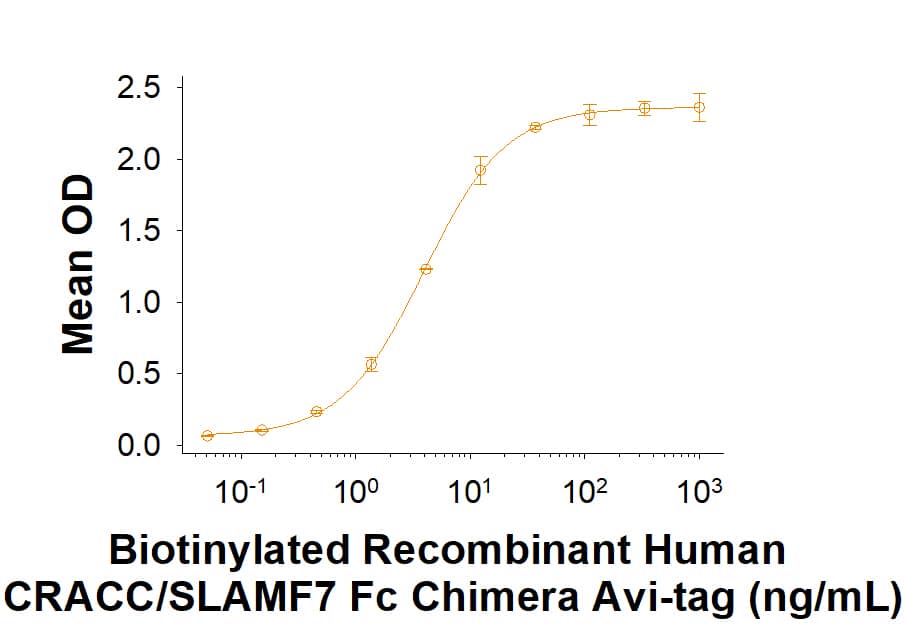Recombinant Human CRACC/SLAMF7 Fc Avi-tag Protein, CF
R&D Systems, part of Bio-Techne | Catalog # AVI1906
Biotinylated

Key Product Details
Learn more about Avi-tag Biotinylated Proteins
Source
HEK293
Accession #
Structure / Form
Disulfide-linked homodimer, biotinylated via Avi-tag
Conjugate
Biotin
Applications
Binding Activity, Bioactivity
Product Specifications
Source
Human embryonic kidney cell, HEK293-derived human CRACC/SLAMF7 protein
| Human CRACC/SLAMF7 (Ser23-Met226) Accession # Q9NQ25.1 |
IEGRMD | Human IgG1 (Pro100-Lys330) |
Avi-tag |
| N-terminus | C-terminus | ||
Purity
>95%, by SDS-PAGE visualized with Silver Staining and quantitative densitometry by Coomassie® Blue Staining.
Endotoxin Level
<0.10 EU per 1 μg of the protein by the LAL method.
N-terminal Sequence Analysis
Ser23
Predicted Molecular Mass
51 kDa
SDS-PAGE
65-85 kDa, under reducing conditions
Activity
The biotin to protein ratio is greater than 0.7 as determined by the HABA assay.
Measured by its binding ability in a functional ELISA.
When Human CRACC/SLAMF7 Antibody (Catalog # MAB1906) is Immobilized at 1.0 μg/mL (100 μL/well), the concentration of Biotinylated Recombinant Human CRACC/SLAMF7 Fc Chimera Avi-tag (Catalog # AVI1906) that produces 50% optimal binding response is found to be approximately 1.00-10.0 ng/mL.
Measured by its ability to inhibit anti-CD3 antibody induced IL-2 or IFN-gamma secretion by human T cells.
The ED50 for this effect is 1-6 μg/mL.
Measured by its binding ability in a functional ELISA.
When Human CRACC/SLAMF7 Antibody (Catalog # MAB1906) is Immobilized at 1.0 μg/mL (100 μL/well), the concentration of Biotinylated Recombinant Human CRACC/SLAMF7 Fc Chimera Avi-tag (Catalog # AVI1906) that produces 50% optimal binding response is found to be approximately 1.00-10.0 ng/mL.
Measured by its ability to inhibit anti-CD3 antibody induced IL-2 or IFN-gamma secretion by human T cells.
The ED50 for this effect is 1-6 μg/mL.
Scientific Data Images for Recombinant Human CRACC/SLAMF7 Fc Avi-tag Protein, CF
Biotinylated Recombinant Human CRACC/SLAMF7 Fc Avi-tag Protein Binding Activity.
When Human CRACC/SLAMF7 Antibody (MAB1906) is immobilized at 1.00 µg/mL (100 µL/well), the concentration of Biotinylated Recombinant Human CRACC/SLAMF7 Fc Chimera Avi-tag (Catalog # AVI1906) that produces 50% optimal binding response is 1.00-10.0 ng/mL.Recombinant Human CRACC/SLAMF7 Fc Avi-tag Protein SDS-PAGE
2 μg/lane of Biotinylated Recombinant Human CRACC/SLAMF7 Fc Chimera Avi-tag (Catalog # AVI1906) was resolved with SDS-PAGE under reducing (R) and non-reducing (NR) conditions and visualized by Coomassie® Blue staining, showing bands at 65-85 kDa and 130-170 kDa, respectively.Formulation, Preparation and Storage
AVI1906
| Formulation | Lyophilized from a 0.2 μm filtered solution in PBS with Trehalose. |
| Reconstitution | Reconstitute at 200 μg/mL in PBS. |
| Shipping | The product is shipped at ambient temperature. Upon receipt, store it immediately at the temperature recommended below. |
| Stability & Storage | Use a manual defrost freezer and avoid repeated freeze-thaw cycles.
|
Background: CRACC/SLAMF7
References
- Veillette, A. (2006) Immunol. Rev. 214:22.
- Tovar, V. et al. (2002) Immunogenetics 54:394.
- Murphy, J.J. et al. (2002) Biochem. J. 361:431.
- Bouchon, A. et al. (2001) J. Immunol. 167:5517.
- Lee, J.K. et al. (2007) J. Immunol. 179:4672.
- Kumaresan, P.R. et al. (2002) Mol. Immunol. 39:1.
- Stark, S. and C. Watzl (2006) Int. Immunol. 18:241.
- Tassi, H. and M. Colonna (2005) J. Immunol. 175:7996.
Alternate Names
CD319, SLAMF7
Gene Symbol
SLAMF7
UniProt
Additional CRACC/SLAMF7 Products
Product Documents for Recombinant Human CRACC/SLAMF7 Fc Avi-tag Protein, CF
Product Specific Notices for Recombinant Human CRACC/SLAMF7 Fc Avi-tag Protein, CF
For research use only
